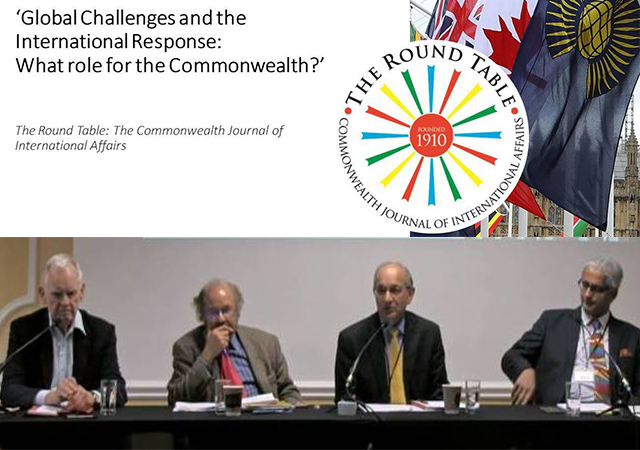 Session one: ‘Multilateralism and soft power in an age of nationalism conflict and division’. Chair: Amitav Banerji
Speakers: David Wardrop, Dr Paul Flather and Arif Zaman.
Session one: ‘Multilateralism and soft power in an age of nationalism conflict and division’. Chair: Amitav Banerji
Speakers: David Wardrop, Dr Paul Flather and Arif Zaman.
A Commonwealth Round Table Conference on ‘Global Challenges and the International Response: What role for the Commonwealth?’ took place on 18-19 January, 2023 at the Cumberland Residential Lodge in Windsor.
Session two: ‘Climate change, small states, inequality and development’
Session three: ‘Upholding human rights, press freedom and democracy: Can the Commonwealth make a difference?’
Session four: ‘After Kigali: The Commonwealth’s future challenges’
Opening remarks by Round Table Chair Victoria Schofield:
The conference commenced with a panel exploring issues of multilateralism and soft power in the current era of increasing nationalism and division. While there have been some notable successes for multilateralism in recent years, not least the agreement reached on the Black Sea Grain Initiative in 2022, there was a sense throughout the panel that multilateralism was under threat and certainly under-utilised in an era of formidable transnational challenges.
David Wardrop (Chair of the Westminster Branch of the United Nations Association) described the dynamics of the current era as being akin to a centrifuge, thrusting nations and individuals apart in their pursuit of self-interest. However, there is no escape from multilateralism in an era dogged by global challenges, and this panel sought to consider whether the Commonwealth was living up to its potential. Wardrop expressed his frustration with the Commonwealth’s reticence in various moments of international tension and urged it to utilise its considerable influence as a regional power, alongside its access to UN resources and spaces, to increase its global impact and better demonstrate the Commonwealth’s unique contribution to the world.
Dr Paul Flather (former Fellow, Mansfield and Corpus Christi Colleges, Oxford) also felt that the Commonwealth is currently ‘conspicuous in [its] absence’ in relation to certain key global concerns. Flather identified three areas in which the Commonwealth could more strongly exert its influence, namely global democratic backsliding, the rise of nationalism and widespread retreat from globalisation, and China’s increasing global influence. This last theme has particular relevance to the small states for whom the Commonwealth is so instrumental in providing a voice, and Flather urged the Commonwealth to provide a credible alternative to Chinese funding to avoid smaller states falling into sovereign debt. He suggested that rather than focusing on soft power, the Commonwealth should utilise ‘smart power’, exerting its influence and expertise in targeted and specific ways.
Arif Zaman (Senior Lecturer at the Bloomsbury Institute and Director of the Commonwealth Businesswomen’s Network) similarly emphasised that, while there was room for positivity in the future of multilateralism, there was a need for people within the Commonwealth to be ‘willing to drive such progress forward.’ In the face of overlapping ‘polycrises’ there is a need for far greater collaboration in monitoring processes, research funding, and data sharing to identify emerging risks and patterns and move to effectively combat them as a multilateral body.
Conference keynote address by the Commonwealth Secretary-General and interview
Opinion on the Round Table Conference – ‘Global Challenges and the International Response: What role for the Commonwealth?’
Session one panel discussion:
[Summaries by Harriet Aldrich, filming by David Aitken-Smith and associates, pictures/ video/ script and production co-ordination by Debbie Ransome.]
Related articles:
Conference closing remarks by Stuart Mole
The pre-CHOGM Round Table conference in 2022 – Is the Commonwealth Working?
Arif Zaman talks about the conference on his Bloomsbury Radio Business Show with guests Alex May, Brian Speers, Nick Hardman-Mountford, Rita Payne and Helen Jones



